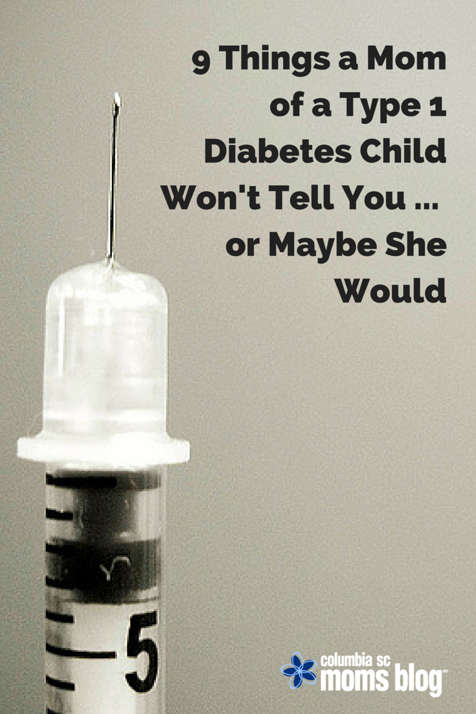 Two summers ago, we got word that our 9-year-old nephew Timothy had been rushed to the emergency room, and then admitted to the hospital, with alarming symptoms. He was subsequently diagnosed with Type 1 diabetes, and his mom and dad started a crash course in what that meant, how to care for him, and how it would change their lives.
Two summers ago, we got word that our 9-year-old nephew Timothy had been rushed to the emergency room, and then admitted to the hospital, with alarming symptoms. He was subsequently diagnosed with Type 1 diabetes, and his mom and dad started a crash course in what that meant, how to care for him, and how it would change their lives.
Although we live hundreds of miles from them, we have been learning too. I am thankful that my sister-in-law has been open about their journey, about the joys and the struggles they have experienced in the last 18 months, giving me a peek into their world and helping me to understand it better. Below are things the mom of a Type 1 diabetic child would like you to know — and would tell you herself if her life slowed down enough to let her breathe.
1. There are two kinds of diabetes and they are not equal. Type 1, also known as juvenile-onset diabetes, is far less common — 5 to 10% of all diabetics. It occurs when the body’s immune system has destroyed the cells in the pancreas that release insulin, without which the body cannot absorb glucose, which is needed to produce energy. Type 2 diabetes is the more common form (90-95% of diabetics). It occurs when the body is insulin resistant, so it can’t use insulin the right way.
2. Type 1 diabetes is not preventable. My child’s diabetes was not caused by a poor diet or obesity, something that can contribute to type 2 diabetes. Nothing in my child’s diet or lifestyle contributed to him getting type 1.
3. There is no cure or possibility of remission with type 1 diabetes. It will not go away if he just eats right or loses weight. He needs insulin to live. His body won’t make it. End of story.
4. My child’s life depends on accurate, regular monitoring of his glucose levels and accurate administration of insulin. Dr. Frederick Banting, the discoverer of insulin, is my hero. Before his discovery, children with diabetes tended to live about a year after diagnosis. My child was diagnosed over a year ago. Do the math. Insulin saves my child’s life every. single. day.
5. Yes, it’s manageable. But type 1 diabetes requires more time, effort, and energy that we ever dreamed it would. It is a job that is 24/7 and taking vacation time can be deadly. We monitor our son’s glucose levels day and night, weekdays and weekends, at home and out of town. Type 1 diabetes is an unwelcome, but now familiar, member of our family.
6. My child lives a normal life. He runs and plays and has hobbies and wrestles with his brothers. But his “normal” involves regularly checking his blood glucose to make sure it is at a healthy level. And I am the ever-vigilant one making sure he is checking and that he is okay. Call me a helicopter parent if you want.
7. My child will not outgrow “juvenile” diabetes. It is not called “juvenile” because it only lasts through childhood, but because that is when it is often diagnosed. My son’s insulin cells are gone. He will not ever outgrow this. My child will live with type 1 diabetes for the rest of his life.
8. Children, especially teens, with type 1 diabetes need support and understanding so they will be comfortable taking responsibility for their own wellness. Adolescence especially is a time when no one wants to seem “different” from their peers, but avoiding responsible care in the name of fitting in can be deadly.
9. More awareness will lead to better understanding and better research and treatment. Research has led to the development of the insulin pump, which makes diabetes even more manageable. Research could, someday, lead to a cure. There is no cure for type 1 diabetes — yet. I pray every day that a cure will be found in my child’s lifetime.
Has type 1 diabetes impacted your life? What do YOU want others to know about it?
For more information about Type 1 Diabetes, visit JDRF.















I really like that you put this information out there for everyone. People that are not affected by Type 1 do not understand how it influences not only the one diagnosed, but the entire family. My daughter was diagnosed at age 5. We spent 4 days in ICU trying to get her little body back to some sort of normal. My wife does an INCREDIBLE job of keeping her life as close to normal as possible. She spends a lot of time talking to doctors, nurses, insurance companies, and other parents with children that have diabetes. I can tell you from personal experience it can be difficult making sure that you count every carb and dose correctly for everything that goes into her mouth. Even then things can go haywire. Just this weekend we had an emergency room visit because she stayed over 480 for over 12 hours. We found out the insulin we had was old and her body was not processing it properly. She is now 12 and healthy and happy – but our new obstacle is puberty. With all of the hormones rushing through her body it is new all over again. Big swings in blood sugars and moods – all over again. I can not give my wife enough credit for taking care of our daughter. Again – thank you for the post and keep them coming – educating everyone is the answer
i would tell you that we really don’t care about your grandfather’s diabetes or that your neighbors aunt had diabetes or that your first grade teachers dog thinks it has diabetes. OURS IS DIFFERENT.
And no, unless you have T1D YOU DONT UNDERSTAND.
I loved reading this because it is all so true. As a family, we struggle every day. I have 3 children and all of them have been diagnosed with Type 1 diabetes. The most recent in January. Our biggest struggle, by far, is keeping track of blood sugars, carbs, and insulin. My goal is to always do better, but we really take one day at a time.
I cannot imagine raising a child, from Any age, with T1D. Everyone who has, does, and will has every ounce of respect from me, for this is more formidable than most people can imagine.
My youngest brother, at the age of 40, after having a sinus infection that just wouldn’t be cured for 1 1/2 years, course after course after course of antibiotics notwithstanding, came down with what he/we thought was the flu.
Thanksgiving 12 years ago I went to his house to check on him, and see if he wanted anything from the store, as I was on my way out. When I walked up to his yard, what I thought was a pink blanket laying on the deck turned out to be him. Naked, sunburned bright red, covered in fire ant bites, and in a coma. 24 hours, 4 EMTs, 2 emergency rooms later, he was diagnosed with adult onset T1D. The coma lasted 5 days, his sugar on admittance was 862.
Thus started our(his and my) crash course into learning how to manage his diabetes. He was turned loose from the hospital in a still very ‘foggy’ state, and with ONE-1- lesson on how to give himself insulin, which the nurse had him do on an orange…left with a paper prescription, and 3 pages of discharge instructions. We managed his first meal and injection on our own, reading the insert from the vial as we went.
After 12 years of doing this as an adult, he has a good handle on his diabetes, but it is the yardstick he measures his days by. Period. Oddly, the most annoying part of the whole thing for him is convincing doctors that his diabetes is not responsible for his physical condition. Every new doctor has to be shown paperwork from ,40 years ago, proving that he didn’t lose his legs
Sorry, didn’t lose his legs from diabetes, but in a car accident when he was 12. Drunk driver speeding thru our neighborhood hit him and severed both legs above the knees.
I came across this a year on from your post. I hope I would have read it properly last year, but since my son’s diagnosis in July, I now truly understand every word. You are a good sister for getting the messages out there. https://racheljgood.wordpress.com
My 14 year old son, was diagnosed with t1 when he was just 9 months old.
I love this article!! I once got asked by a medical professional, after I told him about my son’s t1, if he was overweight!!
These assumptions have really upset me in the past, but now I look at it as a chance to educate people. And I feel happy for them, because they are obviously lucky enough to not have to deal with this disease on a daily basis.
People tend to “know better”, until they do in fact, know better.
Thank you for writing this article I think it is great! in Jan of 2014 at 9 months pregnant I delivered a stillborn baby girl due to a cord accident. Fast forward 10 months and in Oct 2014 our 6 year old son was diagnosed with type 1 diabetes. The struggle is real. We are so greatful for our other children ( now 7 yr old, 4 yr old girl, and 2 month old, but are still morning the death of our baby girl and the loss of freedom we used to have. I feel sorry for him everyday and if I could would take his diabetes and give it to myself. One of the things I struggle with everyday is if and maybe when will my other children get diagnosed with type 1? Also, will I ever get any sleep again?? The constant worry of a parent is tremendous, especially in the middle of the night and during the school day where there is no nurses to care for him since he is in a private school. People don’t truly understand the disease unless you have it. I don’t know what it feels like to be low or high? Yes we know the symptoms but are not in the same boat.
I don’t want him to feel different and yes he can have that cupcake as long he is dosed with the proper amount of insulin, he can eat anything!!
Support is crucial and my family and friends have been great and jdrf has been nothing but helpful and very supportive. Recently my son started a pen pal relationship with another type 1.
I think this will help him with more support from another kid his same age. Bc to me my child with type one is no different than the others. He is such a vibrant, active little boy who I will never categorize as different Bc of his disease and I will never let his disease define him.
One of the toughest things my daughter faced after being diagnosed was at family functions everyone telling a story about a cousin and all the horrible things that could happen and also telling her what she could and could not eat and really being a pest about it. The advice was the hardest part because really type1 especially can be a very personalized disease and advice truly doesn’t help unless it is from the parent of another type 1 diabetic who knows what they are talking about . I also am very glad for the advent of the internet because when she was diagnosed all we had were local support groups that I found boring, depressing and alarmist and no good for us who needed it to be upbeat and informative. The care and knowledge of type 1 has come a long way.there is much more available to monitor and care for the disease some great diagnostic tools and caring and well educated doctors. I am grateful for all these innovations and also the people in my daughters life who have been there for everything … thank you
T1D is preventable. Once a rare disease, T1D has reached epidemic proportions. Please see top of page 7 under ‘Adverse Reactions’ It happened to me thirty years ago, I remember it clearly. I was immediately violently ill with projectile vomiting then gradually lost weight until diagnosed: https://www.merck.com/product/usa/pi_circulars/m/mmr_ii/mmr_ii_pi.pdf
This is neither accurate nor helpful. We can scree better now so we can catch it better. We can also treat it so people are actually living with diabetes instead of dying from it. Coming into a place full of diabetics and their networks and telling them this awful thing that happened is their fault is pretty much always a bad idea.